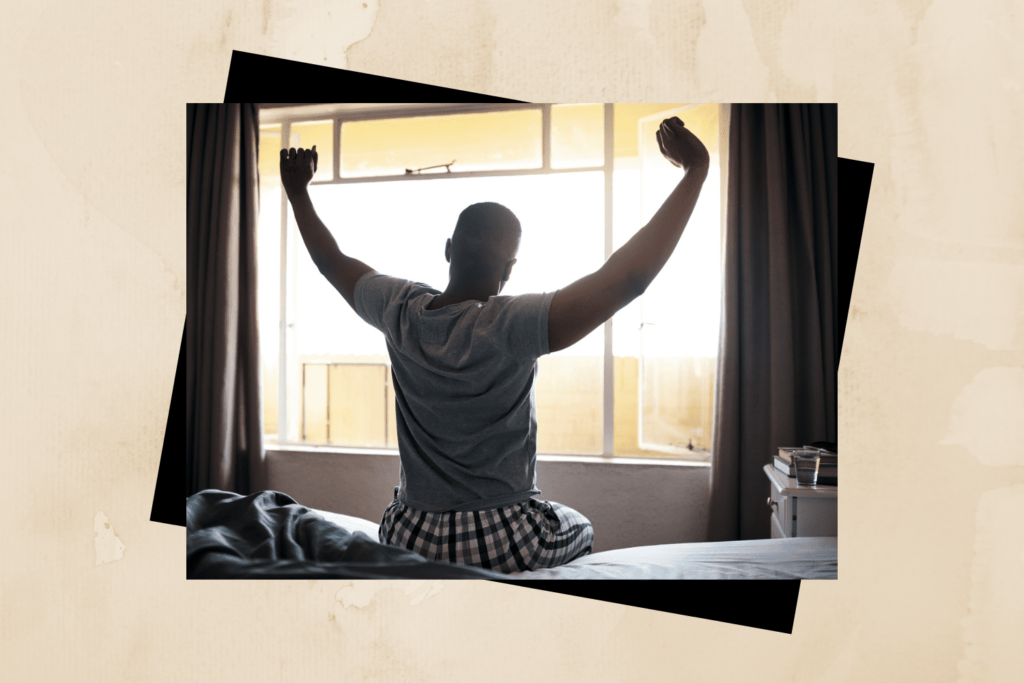Key Takeaways
- A recent study finds that waking up just one hour earlier could reduce a person’s risk of major depression by 23%.
- People who were early risers were less likely to develop depression compared to people who woke up later.
- Following some sleep hygiene tips can help you change your sleeping habits.
Scientists have long touted the benefits of being an early riser. But now, a new study finds night owls should adopt some early bird habits to improve their mental health.
After conducting a study of nearly 840,000 people, researchers found that those who went to bed earlier in the night and woke up earlier experienced lower depression risk. At the same time, they also found that night owls who changed their sleep schedules to rise earlier saw improvements in their mental health.
“Before this study, we knew that there were correlations between the timing of people’s sleep and their risk of depression,” study author Iyas Daghlas, MD, who graduated from Harvard Medical School in May, tells Verywell. Now, he says, there’s evidence for cause and effect.
Researchers at University of Colorado Boulder, the Broad Institute of MIT, and Harvard, published the study in late May in JAMA Psychiatry.
Understanding the Genetic Link
Researchers gathered genetic information from almost 840,000 adults of European ancestry through the U.K. Biobank and 23andMe.
More than 340 genetic variants are known to influence a person’s chronotype. Scientists also believe that genes can account for anywhere between 12% and 42% of our sleep-wake patterns.
Researchers collected sleep-preference questionnaires from about 250,000 participants. They also collected data from 85,000 people who had worn wearable sleep trackers for seven days.
Those who had filled out questionnaires self-identified their chronotype. About a third said they were early birds, 9% reported being night owls, and everyone else was in the middle. On average, people fell asleep at 11 p.m. and woke up at 6 a.m.
Finally, researchers paired genetic information with medical and prescription records and surveys about diagnoses of major depressive disorder (MDD).
‘Early Bird Genes’ Protect From Depression
Using statistical analysis, researchers found that those who carried the “early bird” genetic variants were significantly less likely to develop depression.
What’s more, researchers found that each hour of earlier bedtime was associated with a 23% lower risk of MDD. If you tend to fall asleep around 2 a.m., for example, making a point to go to bed at 11 p.m. or midnight should lower your depression risk even more than cutting back to just 1 a.m.
But the precise number of lowered depression risk matters less, Daghlas says. What’s important is that evidence suggests the effect is there.
What’s unclear, however, is whether early birds can benefit from this advice. If you already go to bed at 10 or 11 p.m. and wake up at 6 or 7 a.m. naturally, waking up an hour earlier may not offer as much protection from depression as for those who sleep later.
To further support this study, Daghlas adds, researchers will need to follow up with clinical trials.
What This Means For You
If you’re a late riser, going to bed earlier and waking up earlier may protect against depression. You can incorporate sleep hygiene tips into your daily routine. This can include being consistent with your sleep schedule and making sure your room is quiet and relaxing before bed.
Why Does Early Rising Ward off Depression?
There’s emerging evidence, Daghlas says, that sleep troubles can heighten depression risk. “People who have depression tend to have sleep problems as a consequence,” he says. But there’s more evidence now that sleep troubles might not be just a symptom, but a contributing factor.
It can also be difficult for a night owl to function in a society created for early birds, Daghlas adds. In addition, research suggests that getting greater light exposure during the day, which early risers tend to do, may influence mood.
In addition to going to bed earlier, a few basic sleep hygiene may lower your risk of depression:
- Be consistent. Go to bed at the same time each night and get up at the same time each morning, including on the weekends.
- Make sure your bedroom is quiet, dark, relaxing, and at a comfortable temperature.
- Remove electronic devices, such as TVs, computers, and smartphones, from the bedroom.
- Avoid large meals, caffeine, and alcohol before bedtime.
- Get some exercise. Being physically active during the day can help you fall asleep more easily at night.
“Before the study, there were several standard sleep hygiene recommendations,” Daghlas says, such as not using blue light at night, or avoiding consumption of caffeine later in the day. “In light of this study, we have even better reason to recommend that now.”
